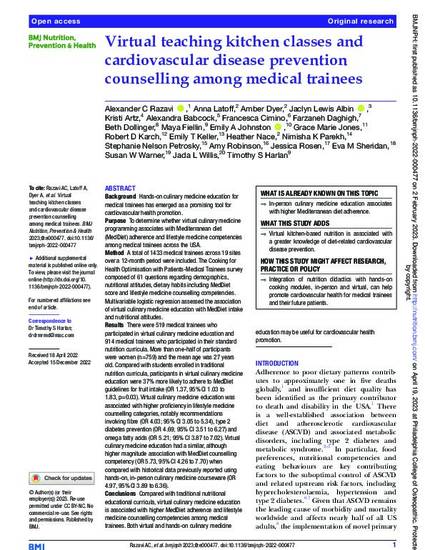
Background: Hands-on culinary medicine education for medical trainees has emerged as a promising tool for cardiovascular health promotion. Purpose: To determine whether virtual culinary medicine programming associates with Mediterranean diet (MedDiet) adherence and lifestyle medicine competencies among medical trainees across the USA. Method: A total of 1433 medical trainees across 19 sites over a 12-month period were included. The Cooking for Health Optimisation with Patients-Medical Trainees survey composed of 61 questions regarding demographics, nutritional attitudes, dietary habits including MedDiet score and lifestyle medicine counselling competencies. Multivariable logistic regression assessed the association of virtual culinary medicine education with MedDiet intake and nutritional attitudes. Results: There were 519 medical trainees who participated in virtual culinary medicine education and 914 medical trainees who participated in their standard nutrition curricula. More than one-half of participants were women (n=759) and the mean age was 27 years old. Compared with students enrolled in traditional nutrition curricula, participants in virtual culinary medicine education were 37% more likely to adhere to MedDiet guidelines for fruit intake (OR 1.37, 95% CI 1.03 to 1.83, p=0.03). Virtual culinary medicine education was associated with higher proficiency in lifestyle medicine counselling categories, notably recommendations involving fibre (OR 4.03; 95% CI 3.05 to 5.34), type 2 diabetes prevention (OR 4.69; 95% CI 3.51 to 6.27) and omega fatty acids (OR 5.21; 95% CI 3.87 to 7.02). Virtual culinary medicine education had a similar, although higher magnitude association with MedDiet counselling competency (OR 5.73, 95% CI 4.26 to 7.70) when compared with historical data previously reported using hands-on, in-person culinary medicine courseware (OR 4.97, 95% CI 3.89 to 6.36). Conclusions: Compared with traditional nutritional educational curricula, virtual culinary medicine education is associated with higher MedDiet adherence and lifestyle medicine counselling competencies among medical trainees. Both virtual and hands-on culinary medicine education may be useful for cardiovascular health promotion.
Available at: http://works.bepress.com/farzaneh_daghigh/18/

This article was published in BMJ Nutrition, Prevention and Health.
The published version is available at http://dx.doi.org/10.1136/bmjnph-2022-000477.
Copyright © 2023 Author(s) (or their employer(s)). CC BY-NC 4.0.